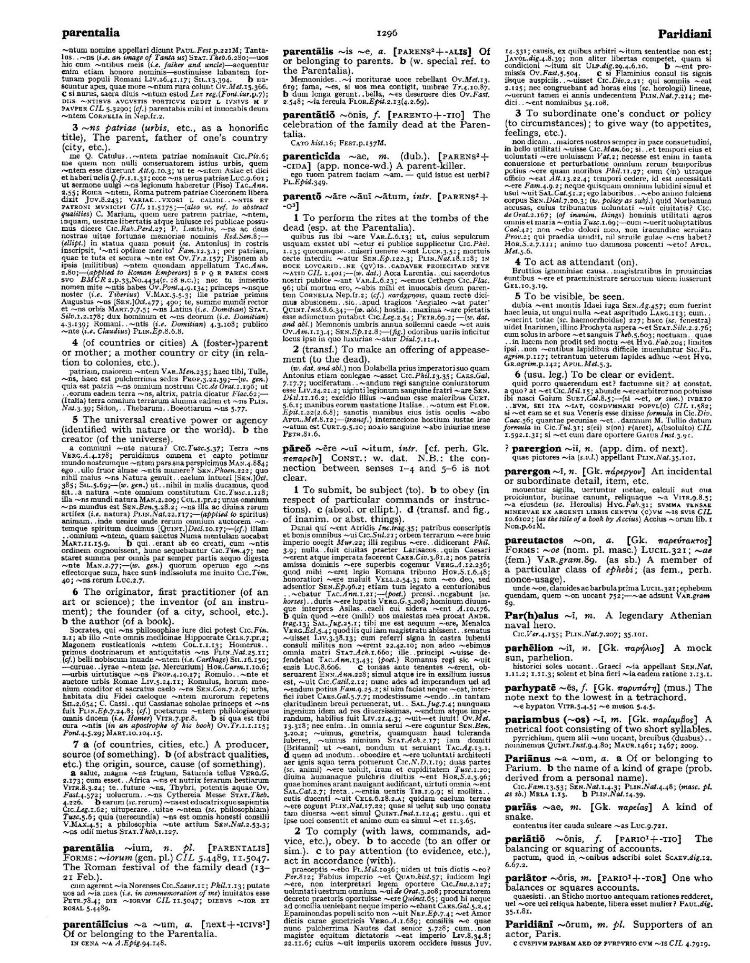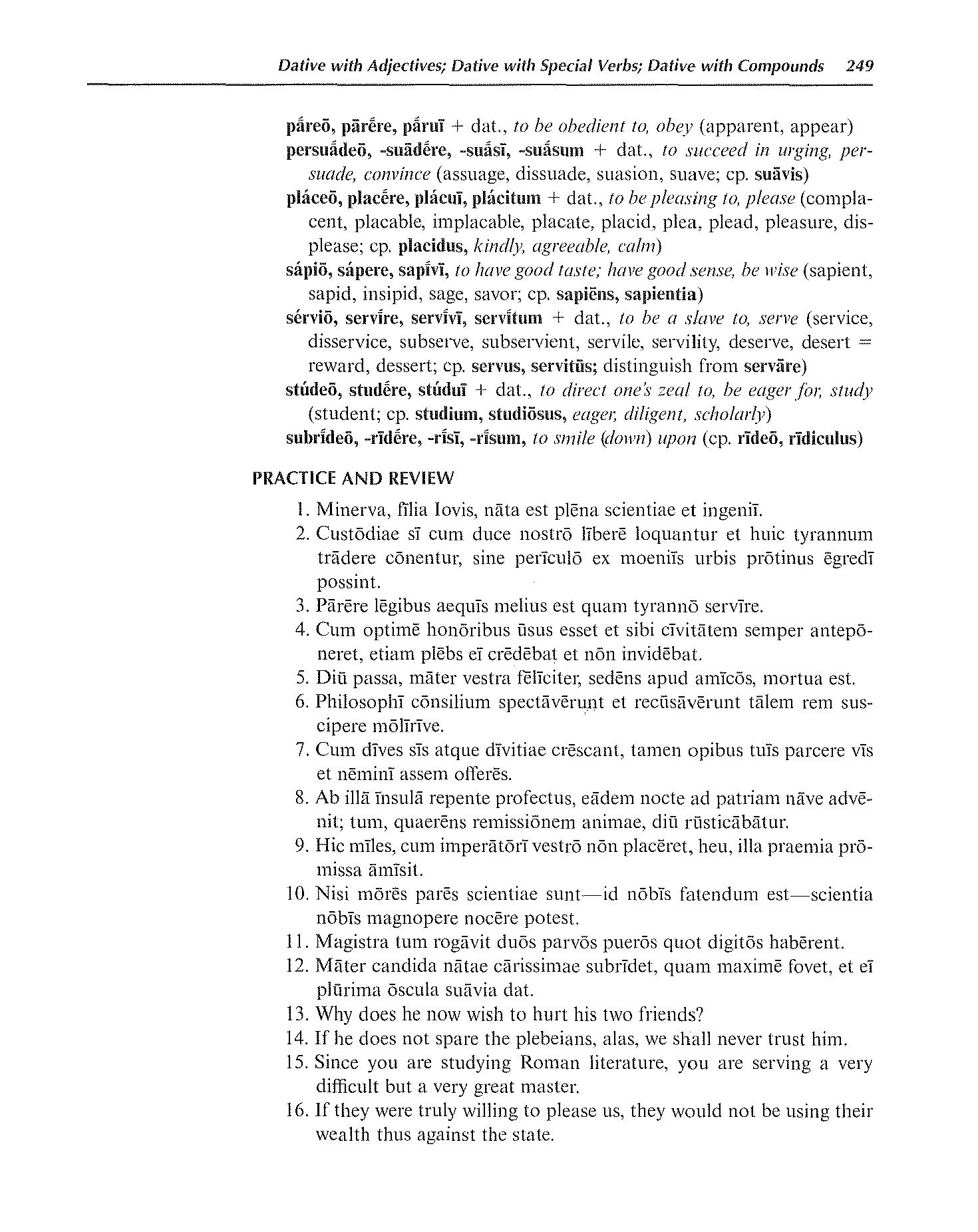
page_listing.tpl
page_subListingDetails.tpl
sub_listingDetails_style1.tpl
sub_listingDetails.title.tpl
pārēre to obey
pārēre is a Latin Verb that primarily means to obey.
Definitions for pārēre
Wheelock's Latin
Verb
- 1
+dat., to be obedient to, obey
English derivatives:
apparent appear
Oxford Latin Dictionary
Verb
- 1
To submit, be subject (to). (b) to obey (in respect of particular commands or instructions). (c) (absol. or ellipt.). (d) (transf. and fig., of inanim. or abst. things).
- 2
To comply (with laws, commands, advice, etc.), obey. (b) to accede (to an offer or sim.). (c) to pay attention (to evidence, etc.), act in accordance (with).
- 3
To subordinate one's conduct or policy (to circumstances); to give way (to appetites, feelings, etc.).
- 4
To act as attendant (on).
- 5
To be visible, be seen.
Sentences with pārēre
Latin to English
Vēritātī et sapientiae semper studeāmus et pāreāmus.Compare Let us always study and obey truth and wisdom.
Tibi imperāvit ut ducī pārērēs.Compare He commanded you to obey the leader.
Eum ōrāvī nē rēgī turpī pārēret.Compare I begged him not to obey the disgraceful king.
Ad hoc sacramentum adacti sumus, ferre mortalia nec perturbari iis, quae vitare non est nostrae potestatis. In regno nati sumus; deo parere libertas est. [De vita beata, XV, 7]Compare This is the sacred obligation by which we are bound - to submit to the human lot and not to be disquieted by those things which we have the power to avoid. We have been born under a monarchy; to obey God is freedom.
In regno nati sumus; deo parere libertas est.Compare We have been born under a monarchy; to obey God is freedom.
At annus post Paullus pareo auspicium.Compare But a year later Paullus obeyed the auspices.
Atque utinam primus ille litterae pareo.Compare And I wish that I had obeyed that first letter.
Conjugation table for pārēre
Cactus2000
| ACTIVE | |
| Indicative present | Indicative imperfect |
| pāreō pārēs pāret pārēmus pārētis pārent | pārēbam pārēbās pārēbat pārēbāmus pārēbātis pārēbant |
| Indicative perfect | Indicative pluperfect |
| pāruī pāruistī pāruit pāruimus pāruistis pāruērunt / pāruēre | pārueram pāruerās pāruerat pāruerāmus pāruerātis pāruerant |
| Indicative future | Indicative future perfect |
| pārēbō pārēbis pārēbit pārēbimus pārēbitis pārēbunt | pāruerō pārueris pāruerit pāruerimus pārueritis pāruerint |
| Subjunctive present | Subjunctive imperfect |
| pāream pāreās pāreat pāreāmus pāreātis pāreant | pārērem pārērēs pārēret pārērēmus pārērētis pārērent |
| Subjunctive perfect | Subjunctive pluperfect |
| pāruerim pārueris pāruerit pāruerimus pārueritis pāruerint | pāruissem pāruissēs pāruisset pāruissēmus pāruissētis pāruissent |
Infinitive present pārēre Infinitive perfect pāruisse Infinitive future pāritūrum esse | Imperative present pārē pārēte Imperative future pārētō pārētō pārētōte pārentō |
| Indicative present | Indicative imperfect |
| - - pārētur - - - | - - pārēbātur - - - |
| Indicative perfect | Indicative pluperfect |
| - - - - - - | - - - - - - |
| Indicative future | Indicative future perfect |
| - - pārēbitur - - - | - - - - - - |
| Subjunctive present | Subjunctive imperfect |
| - - pāreātur - - - | - - pārērētur - - - |
| Subjunctive perfect | Subjunctive pluperfect |
| - - - - - - | - - - - - - |
Infinitive present pārērī Infinitive perfect - Infinitive future - | Imperative present - - Imperative future - pārētō - - |
| PARTICIPLE | ||
| Participle present active | ||
| Nom. | pārēns | pārentēs |
| Gen. | pārentis | pārentium |
| Dat. | pārentī | pārentibus |
| Acc. | pārentem | pārentēs |
| Abl. | pārente | pārentibus |
| Participle future active | ||
| Nom. | pāritūrus | pāritūrī |
| Gen. | pāritūrī | pāritūrōrum |
| Dat. | pāritūrō | pāritūrīs |
| Acc. | pāritūrum | pāritūrōs |
| Abl. | pāritūrō | pāritūrīs |
| Participle perfect passive | ||
| Nom. | - | - |
| Gen. | - | - |
| Dat. | - | - |
| Acc. | - | - |
| Abl. | - | - |
| Gerundive | ||
| Nom. | pārendus | pārendī |
| Gen. | pārendī | pārendōrum |
| Dat. | pārendō | pārendīs |
| Acc. | pārendum | pārendōs |
| Abl. | pārendō | pārendīs |
| Gerund | Supine | |
| Nom. | pārēre | - |
| Gen. | pārendī | - |
| Dat. | pārendō | |
| Acc. | pārendum | |
| Abl. | pārendō | |
Data sources
Notes
- Definitions
- Frederick M. Wheelock, Wheelock's Latin, 6th ed., rev. Richard A. LaFleur (New York, NY: HarperCollins Publishers, 2005): 249.
- P. G. W. Glare, Oxford Latin Dictionary, Vols. 1-8 (Oxford: Clarendon Press, 1982): 1296.
- Word frequencies
- Christopher Francese, "Latin Core Vocabulary," Dickinson College Commentaries, last modified 2014, http://dcc.dickinson.edu.
- Paul B. Diederich, The Frequency of Latin Words and Their Endings, PhD diss., (Columbia University, 1939).
- Louis Delatte, Suzanne Govaerts, Joseph Denooz, and Etienne Evrard, Dictionnaire fréquentiel et index inverse de la langue latine [Frequency Dictionary and Inverse Index of the Latin Language] (Liège, Belgium: Laboratoire d'analyse statistique des langues anciennes de l'Université de Liège [L.A.S.L.A.], 1981): 123.
Bibliography
Allen, Joseph H. Allen and Greenough's New Latin Grammar for Schools and Colleges: Founded on Comparative Grammar. Edited by James B. Greenough, George L. Kittredge, Albert A. Howard, and Benjamin L. D'Ooge. Boston, MA: Ginn & Company, 1903.
Crystal, David. A Dictionary of Linguistics and Phonetics. 6th ed. Oxford, UK: Blackwell Publishing, 2008.
Delatte, Louis, Suzanne Govaerts, Joseph Denooz, and Etienne Evrard. Dictionnaire fréquentiel et index inverse de la langue latine [Frequency Dictionary and Inverse Index of the Latin Language]. Liège, Belgium: Laboratoire d'analyse statistique des langues anciennes de l'Université de Liège (L.A.S.L.A.), 1981.
Diederich, Paul B. The Frequency of Latin Words and Their Endings. PhD diss., Columbia University, 1939.
Francese, Christopher. "Latin Core Vocabulary." Dickinson College Commentaries. Last modified 2014. http://dcc.dickinson.edu/latin-vocabulary-list.
Gildersleeve, Basil L., and Gonzales Lodge. Gildersleeve's Latin Grammar: Third Edition, Revised, and Enlarged. 3rd ed. London, England: Macmillan and Co., 1903.
Glare, Peter G.W. Oxford Latin Dictionary. Vols. 1-8. Oxford, England: Clarendon Press, 1982.
Krüger, Bernd. "Latin Conjugation Tables." Cactus2000. Accessed May 5, 2023. https://latin.cactus2000.de/index.en.php.
Pierson, Nick. "Sound of Text." Accessed October 26, 2019. https://soundoftext.com.
Wheelock, Frederick M. Wheelock's Latin. 6th ed. Revised by Richard A. LaFleur. New York, NY: HarperCollins Publishers, 2005.
Wiktionary Contributors. "Victionarium." Wikimedia Foundation, Inc. Updated March 18, 2019. https://la.wiktionary.org/wiki/Victionarium:Pagina_prima.
Citation
Chicago (17th ed.)
Allo Contributors. "pāreō, pārēre, pāruī (v.) - Latin Word Definition." Allo Latin Dictionary. Last modified . Accessed February 19, 2026. http://ancientlanguages.org/latin/dictionary/pareo-parere-parui-pariturum.
Entry created on . Last updated on .







